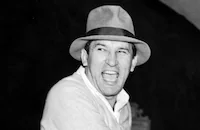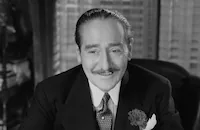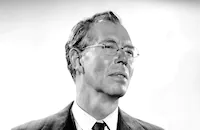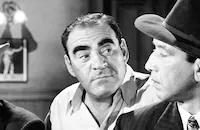Syncopation

Brief Synopsis
Cast & Crew
William Dieterle
Adolphe Menjou
George Bancroft
Todd Duncan
Connie Boswell
Ted North
Film Details
Technical Specs

Synopsis
In New Orleans in 1906, the Congo Square Building, formerly the site of slave auctions, now serves as an African-American employment bureau. Nearby, in an African- American college of music, an instructor is teaching his pupils to play Bach. Seven-year-old Reggie Tearbone, who is learning to play the cornet, is unable to follow the sheet music, however, and after playing a few bars, begins to improvise a jazz composition. Reggie lives with his mother Ella, who is employed as a servant in the home of architect George Latimer, a member of the once aristocratic but now impoverished Latimer family. One day, Latimer's old friend, Steve Porter, comes to visit from Chicago, accompanied by his son Paul. Upon learning of Latimer's financial problems, Porter persuades the architect and his young daughter Kit to go back home to Chicago with him. Ella accompanies the family, but Reggie, who has secured a job playing in King Jeffers' Basin Street Band, remains in New Orleans. As the family travels up the Mississippi River, they hear the music of Memphis and St. Louis. By 1916, a new style of jazz has developed out of Ragtime. On Kit's seventeenth birthday, Latimer and the Porters leave her to celebrate alone while they entertain some clients. Lonely, Kit wanders out onto the street and there meets Johnny Schumacher, a struggling young cornetist. Johnny takes Kit to a party at the apartment of musical promoter Smiley Jackson, and when Kit incites a riot with her New Orleans-style piano playing, she is arrested. At her trial, Kit is acquitted when she wins over the jury with a rousing rendition of boogie-woogie piano. The advent of World War I transforms both American music and the Latimer family. When the war forces the closure of Basin Street, Reggie, now known as "Rex Tearbone, King of the Cornet," travels to Chicago with Jackson, now a successful music impresario. Paul, now engaged to Kit, bids her farewell as he goes off to war. After Paul is killed in combat, Johnny and Kit realize that they love each other. Soon after the war ends, they are married, and Johnny gets a job on the road, playing in a large jazz orchestra. Kit, protesting that he will never be happy playing the circumscribed repetoire of the orchestra, refuses to travel with him. Becoming disillusioned when he is denied his promised featured spot in the band, Johnny quits and, after wandering around finds new musical inspiration in the hobo "jungles." He receives an offer from Smiley, who is now a successful booker for whom Kit is working, to come to New York. There he reconciles with Kit, while Smiley arranges some bookings for his new band. At first, Johnny's new sound is a failure, then his audience realizes its dance potential. Dubbed "swing," Johnny's music revolutionizes the sound of jazz, and all ends happily for Kit and Johnny as they listen to a jam session featuring several great jazz musicians.

Director

William Dieterle
Cast

Adolphe Menjou

George Bancroft
Todd Duncan
Connie Boswell
Ted North
Frank Jenks
Jessie Grayson

Mona Barrie
Lindy Wade
Peggy Mcintyre

Jackie Cooper

Bonita Granville
The All American Dance Band
Charlie Barnet
Benny Goodman
Harry James
Jack Jenny
Gene Krupa
Alvino Rey
Joe Venuti
Hall Johnson Choir

Robert Benchley

Walter Catlett
Charles Collins
Jack Thompson
Sherrill Luke

Walter Baldwin

Jeff Corey
Rex Stewart
Clinton Rosemond
Frank Mcglynn
Maurice Cass
Edwin Stanley
Bob Mckenzie
Thelma White
Martha Bamattre
Al Roberts
James Clemons
Emory Parnell
Frank Darien
Madame Borget
Billy Reed
Charles Flynn
Frank O'connor
J. Louis Johnson

Ralph Dunn
Bill Lally
Sonny Bupp
Mimi Doyle
Eddie Hart

John Hamilton
Lillian West
Michael Audley
Robert Dudley
Tommy Quinn
Jane Patten
Dick Paxton
Sidney Miller
Joe Brown Jr.
Jack Finch
Joe Bernard
Reginald Barlow
Bobby Stebbins
Hollis Jewell
William J. O'brien
Frank Mills
Mickey Simpson
Joe Devlin
Spec O'donnell
Hallene Hill
John Tettemer
Dudley Dickerson
Gordon Hart
Armando And Lita
Leith Stevens
Effie Parnell
Jerry Housner
Dewey Robinson
Earle Hodgins
Gus Glassmire
Kenneth Terrell
Edward Dew
Max Wagner
Charles Sullivan
Sammy Stein
Jeanette Bradley
Gertrude Messinger
Jack Stewart
Dolly Jarvis
Francisco Maran
Charles Moore
Sunny Boyne
Louis Adlon
Crew
Michael Audley
Peter Berneis
Frank Cavett
Russell A. Cully
Albert D'agostino
Valentine Davies
William Dieterle
William Dieterle
Charles L. Glett
Rich Hall
Al Herman
J. Roy Hunt
Hall Johnson
Ernst Matray
John Pommer
Darrell Silvera
Dewey Starkey
Leith Stevens
Leith Stevens
Edward Stevenson
James G. Stewart
John Sturges
Douglas Travers
Richard Van Hessen
Vernon L. Walker
Philip Yordan

Film Details
Technical Specs

Quotes
Trivia
Notes
The working title of this film was The Band Played On. In the opening onscreen credits, the actors are listed as "In front of the camera," and the names of the production crew are listed, without their specific jobs, as working "In back of the camera." Specific credits appear at the end of the film. According to pre-production news items in Hollywood Reporter, RKO originally allotted seventy-two days to shoot this film, but had to speed up production so that Ted North and Adolphe Menjou could start shooting the Twentieth Century-Fox film Roxie Hart (see below). Jack Briggs was tested for one of the leads in the picture, according to another Hollywood Reporter news item, and Ethel Waters was signed to appear, according to a Daily Variety news item. Neither actor appeared in the released film, however. Other news items in Hollywood Reporter note that background shots were filmed in Chicago and New York. According to a February 1942 Hollywood Reporter news item, writer Philip Yordan was originally hired to work only as technical advisor on one sequence of the film, but was granted screen credit with Frank Cavett after it was established that he contributed to the entire screenplay.
According to materials contained in the RKO Archives Production Information Files at the UCLA Arts Library-Special Collections, legendary trumpet player Bunny Berigan was hired, early in January 1942, to dub the cornet passages which had been filmed earlier using guide tracks. However, that was not an easy task to perform and a modern source suggests that Berigan, who was battling alcoholism and would die six months later, May have had part or all of his work redone by George Thow. Rex Stewart, cornet player with the Duke Ellington band, appears in the film in a role apparently modeled on Joe (King) Oliver. The film's musical director, Leith Stevens, appears in the film as orchestra leader "Ted Browning." Among the many compositions performed in part in the film are "You Made Me Love You," "St. Louis Blues," "Copenhagen," "Jazz Me Blues," "Sugarfoot Stomp" and "Blow Your Trumpet, Gabriel."
The RKO Script Collection, also at UCLA, contains a dialogue continuity, dated November 29, 1941, which appears to be a record of a first cut, made as the film was finishing shooting, and is minus titles, montages and the climactic jam session. That assembly ran 13,118 feet or 146 minutes. As evidenced by the inclusion in the Call Bureau Cast Service list of several characters who do not appear in the film including those portrayed by Robert Benchley and Walter Catlett, the film was severely cut before its release at a running time of 88 minutes. Among the sequences filmed, but cut, was one in which "Johnny" finds his musical inspiration while living with hoboes.
An Los Angeles Times news item adds that a nationwide contest in Saturday Evening Post determined which jazz musicians would perform in this film. This picture is not related to the 1929 RKO film Syncopation (see AFI Catalog of Feature Films, 1921-30; F2.5570).












